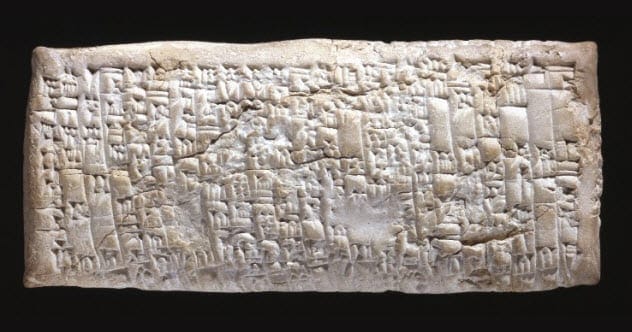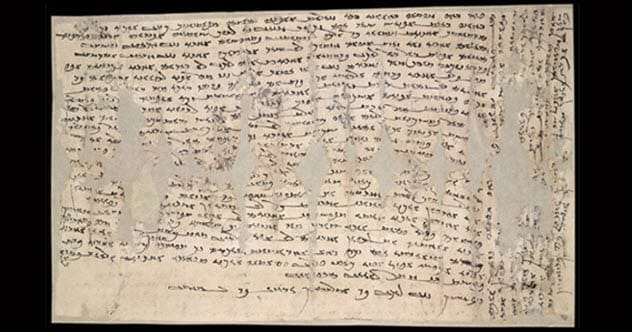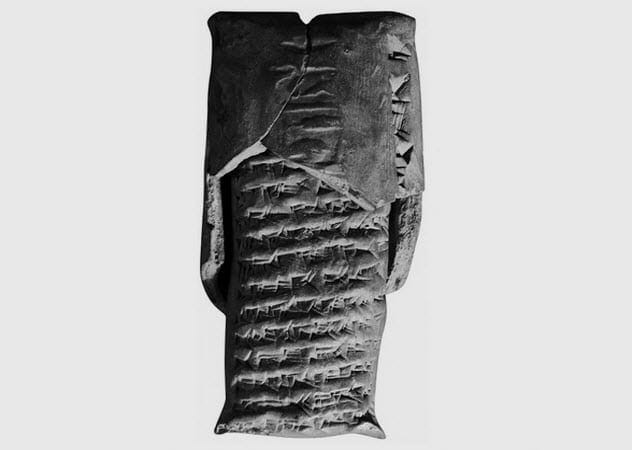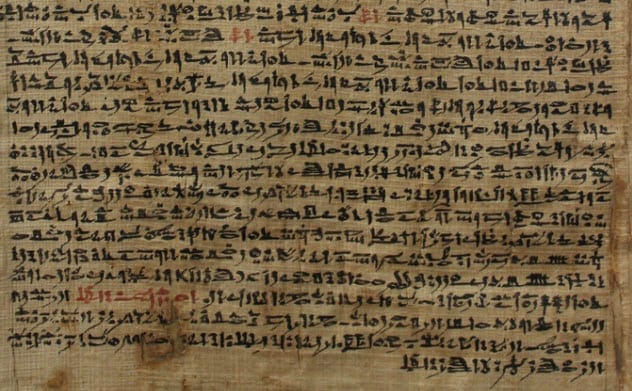Human nature is a funny thing. We’ve built empires, invented amazing technologies, and created breathtaking art. Yet, some things about us haven’t changed a bit, no matter if we lived in ancient Sumeria or modern-day New York. One of those unchanging things? Getting really, really mad and wanting to tell someone all about it.
It turns out, writing isn’t just for poetry and history books. It’s also a fantastic tool for telling someone they’ve messed up – badly! We’ve dug up some amazing examples of pure, unfiltered anger written down centuries ago. Get ready to explore 10 historical letters that range from mildly annoyed to absolutely furious.
10. Letters Between Pope Innocent IV And Guyuk Khan

Back in March 1245, the Mongol armies were sweeping through Russia and Eastern Europe. Pope Innocent IV wasn’t happy about this. He sent letters to Guyuk Khan, the Mongol leader, hoping to stop the invasion of Christian lands. He also tried to understand the Khan’s plans and maybe even convert the Mongols to Christianity.
The Pope wrote, trying to sound a warning: “God has up to the present allowed various nations to fall before your face; for sometimes He refrains from chastising the proud in this world for the moment, for this reason, that if they neglect to humble themselves of their own accord He may not only no longer put off the punishment of their wickedness in this life but may also take greater vengeance in the world to come.” Basically, he was saying, “God’s letting you win for now, but be careful, because He punishes the proud.”
Guyuk Khan’s reply was basically, “I don’t get what you’re saying.” He often stated, “I have not understood.” He also shot back: “How do you think you know whom God will absolve and in whose favor He will exercise His mercy? How do you think you know that you dare to express such an opinion? Through the power of God, all empires from the rising of the Sun to its setting have been given to us and we own them. How could anyone achieve anything except by God’s order?”
Both leaders believed they were God’s chosen representative. So, neither one backed down. They both thought they were right, and their letters show just how upset they were with each other.
9. Letters Between Frederick I And Saladin

Frederick I, also known as Frederick Barbarossa, heard that Saladin, a powerful Muslim leader, was heading towards Jerusalem. Frederick quickly sent a letter to warn Saladin to stay away.
He threatened: “We can scarcely believe that you are ignorant of that which all antiquity and the writings of the ancients testify that innumerable countries have been subject to our sway? All this is well-known to those kings in whose blood the Roman sword has so often steeped: and you, God willing, shall learn by experience the might of our victorious eagles, and be made acquainted with our troops of many nations.” Frederick then listed all the armies he commanded.
But here’s the catch: by the time Saladin got the letter, he had already conquered Jerusalem three months earlier! Saladin’s reply was cleverly worded. He wrote: “We make it known to the sincere and powerful king, our great and amicable friend, the king of Germany, that a certain man called Henry came to us professing to be your envoy, and he gave us a letter which he said was from your hand. [ … ] You enumerate all those who are leagued with you against us… But we wished to enumerate those who are in our service… this is a list which could not be reduced to writing.”
Saladin’s tone was a mix of respect and a bit of a taunt. It was like saying, “Hey Frederick, this guy Henry brought an angry letter supposedly from you, but I know we’re buddies. Since you probably didn’t say those mean things, don’t worry about my huge list of armies that could totally beat yours.” Despite this, Frederick later joined the Third Crusade to try and take Jerusalem back from Saladin, a journey during which he died.
8. Complaint Tablet To Ea-Nasir

Imagine ordering something important and getting a terrible product. That’s what happened to Nanni nearly 4,000 years ago, around 1750 BC, in the Babylonian city of Ur. He needed copper, but the shipment he got from a merchant named Ea-nasir was awful.
So, Nanni did what many of us would do: he wrote a customer service complaint. But instead of an email, he wrote it in cuneiform script on a clay tablet! This ancient angry letter is now in The British Museum.
He wrote: “Tell Ea-nasir: Nanni sends the following message: When you came, you said to me as follows: ‘I will give Gimil-Sin (when he comes) fine quality copper ingots.’ You left then but you did not do what you promised me. You put ingots which were not good before my messenger (Sit-Sin) and said: ‘If you want to take them, take them; if you do not want to take them, go away!’”
Nanni felt disrespected: “What do you take me for, that you treat somebody like me with such contempt? I have sent as messengers gentlemen like ourselves to collect the bag with my money (deposited with you) but you have treated me with contempt by sending them back to me empty-handed several times, and that through enemy territory.”
He then demanded his money back and stated: “Take cognizance that (from now on) I will not accept here any copper from you that is not of fine quality. I shall (from now on) select and take the ingots individually in my own yard, and I shall exercise against you my right of rejection because you have treated me with contempt.” археологическиеIt seems Ea-nasir’s bad business dealings might have cost him. Excavations of his home suggest he had to downsize, possibly due to a failing copper business.
7. Sogdian Ancient Letter From Woman In Distress

The Sogdians were an ancient Iranian people who were key traders on the Silk Road between the 4th and 9th centuries. One Sogdian woman found herself stranded in the city of Dunhuang and was clearly very angry with her husband.
In a letter to him, she poured out her frustration: “Behold, I am living … badly, not well, wretchedly, and I consider myself dead. Again and again, I send you a letter, but I do not receive a single letter from you, and I have become without hope toward you. My misfortune is this, that I have been in Dunhuang for three years thanks to you, and there was a way out a first, a second, even a fifth time, but he refused to bring me out.”
Her anger reached a peak when she wrote: “Surely, the gods were angry with me on the day when I did your bidding! I would rather be a dog’s or a pig’s wife than yours!” Ouch! That’s some serious ancient fury.
6. Esarhaddon’s Refusing A Letter

During the Neo-Babylonian Empire, letters were often written on clay cylinders. An outer layer of clay acted like an envelope, with the sender’s and recipient’s names on it. This meant you could see who sent a letter before opening it.
One man named Esarhaddon received a letter from someone he didn’t consider a true Babylonian, even though that person lived in Babylon. Esarhaddon was so annoyed that he sent the letter back unopened. He included an angry note of his own explaining why:
“I am herewith sending back to you, with its seals intact, your completely pointless letter that you sent to me. Perhaps you will say: ‘Why did he return it to us?’ When the citizens of Babylon, who are my servants and love me, wrote to me, I opened their letter and read it. Now, would it be good that I should accept and read a letter from the hands of criminals who disrespect the god?” Esarhaddon clearly thought reading the letter would be beneath him.
5. Hoshayahu’s Letter Defending His Literacy

In ancient times, messengers often read letters aloud to the recipient. Sometimes, a scribe would do it. But Hoshayahu, an ancient Hebrew civil servant in the city of Lachish, was proud to read his own letters.
His superior hinted that Hoshayahu couldn’t read the letters sent to him. Hoshayahu was insulted! He wrote back to set his superior straight, and his anger is clear:
“And now, please explain to your servant the meaning of the letter which you sent to your servant yesterday evening. For your servant has been sick at heart ever since you sent that letter to your servant. In it, my lord said: ‘Don’t you know how to read a letter?’ As Yahweh lives, no one has ever tried to read me a letter! Moreover, whenever any letter comes to me and I have read it, I can repeat it down to the smallest detail.” Don’t mess with Hoshayahu’s reading skills!
4. Thonis’s Letter To His Father

In the 3rd century AD, a young man named Thonis was getting frustrated with his father, Arion. Arion was supposed to arrange for a teacher for Thonis but kept delaying his visit and hardly wrote to his son.
Thonis started his letter politely enough, wishing his father good health. But then he got straight to the point, urging his dad to come soon. He wrote: “Now look, this is the fifth letter I have written, and except for one, you have not written to me, even about your being well, nor have you come to see me.”
He continued, highlighting his father’s broken promise: “Having promised me ‘I am coming,’ you didn’t come so that you could find out whether the teacher was attending to me or not. So, practically every day, he asks about you, ‘Isn’t he coming yet?’ and I say just the one word, ‘Yes.’ … So make the effort to come to me quickly so that he can teach me—as he is keen to do.”
Thonis ended politely again but then added a hasty, almost passive-aggressive reminder: “Remember my pigeons.” It’s a classic case of a child being annoyed with a forgetful parent.
3. Pliny The Younger’s Letter To Septitius Clarus

Pliny the Younger was a powerful Roman senator. One day, his good friend Septitius Clarus was supposed to come to dinner but never showed up. Pliny was stood up!
He wrote a letter to his friend, playfully demanding to be paid back for the wasted dinner. While it seems angry, it’s more of a mock anger. Pliny mostly seemed disappointed they didn’t get to hang out.
“AH! You are a pretty fellow! You make an engagement to come to supper and then never appear. Justice shall be exacted; you shall reimburse me to the very last penny the expense I went to on your account; no small sum, let me tell you.”
He then added: “Oh! you have behaved cruelly, grudging your friend, I had almost said yourself; and upon second thoughts, I do say so; in this way: for how agreeably should we have spent the evening, in laughing, trifling, and literary amusements! You may sup, I confess, at many places more splendidly; but nowhere with more unconstrained mirth, simplicity, and freedom: only make the experiment, and if you do not ever after excuse yourself to your other friends to come to me, always put me off to go to them. Farewell.” Even in anger, Pliny knew how to throw a good-natured jab.
2. Cicero’s Letter To M. Fadius Gallus

Cicero, the famous Roman statesman, had allowed Fadius Gallus to buy things for him. However, Fadius Gallus bought a collection of statues for Cicero without telling him first. When Cicero got home, he received a bill for statues he absolutely hated.
Cicero, though annoyed, said he would pay. But he made his displeasure clear: “But, my dear Gallus, everything would have been easy if you had bought the things I wanted and only up to the price that I wished. However, the purchases which, according to your letter, you have made shall not only be ratified by me, but with gratitude besides. For I fully understand that you have displayed zeal and affection in purchasing (because you thought them worthy of me) things which pleased yourself… Still … there is absolutely none of those purchases that I care to have.”
He then explained exactly why Fadius messed up: “But you, being unacquainted with my habits, have bought four or five of your selection at a price at which I do not value any statues in the world. You compare your Bacchae with Metellus’s Muses. Where is the likeness? … But Bacchae! What place is there in my house for them? What, again, have I, the promoter of peace, to do with a statue of Mars?” Cicero was not shy about expressing his artistic (and financial) frustrations!
1. An Ancient Egyptian Widow’s Appeal To Her Dead Brother

In ancient Egypt, from at least 2686–1069 BC, people had a custom of writing letters to their dead loved ones. They believed the dead were powerful and could help the living, maybe even by arguing their case in an underworld court to stop misfortune.
One very moving letter was written by a grieving mother to her dead brother. She was begging him to help her daughter. This personal letter is one of the earliest recorded messages from a woman in Egypt, and her pain is palpable.
She wrote: “A sister speaks to her brother. The sole friend Nefersefkhi. A great cry of grief! To whom is a cry of grief useful? You are given it for the crimes committed against my daughter evilly, evilly, though I have done nothing against him, nor have I consumed his property. He has not given anything to my daughter. Voice offerings are made to the spirit in return for watching over the earthly survivor. Make you your reckoning with whoever is doing what is painful to me, because my voice is true against any dead man or any dead woman who is doing these things against my daughter.” Her desperate plea shows a deep belief in the power of the dead and a mother’s fierce love.
These letters, etched in clay, written on papyrus, or penned on paper, remind us that feelings like anger, frustration, and disappointment are timeless. Whether it’s a bad copper deal, a no-show dinner guest, or a major political disagreement, humans have always found a way to express their displeasure. It’s fascinating to see these raw emotions preserved from centuries past, connecting us to people who lived lives so different, yet so similar, to our own.
What do you think? Which of these angry ancient letters surprised you the most? Leave your comment below and share your thoughts!










